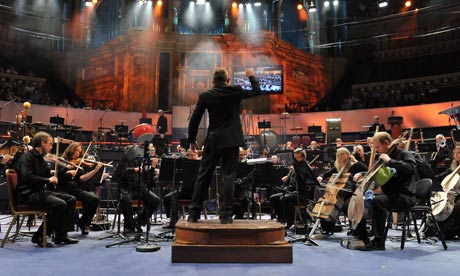
What constitutes a good concert opener? My favourite is not actually for a concert, but an opera. I love the honking car horns in raucous counterpoint that start György Ligeti's Le Grand Macabre. The music is irreverent; it doesn't behave itself, it wakes the audience up. I hate well-behaved fanfares, the sort with clever little harmonic sidesteps and neat academic counterpoint. Give me messy, give me dirty. Listen to the way Beethoven begins many of his overtures: "Pay attention: you are going to listen to me." Take his overture to Coriolan. It starts with a big, heavy unison in the strings, followed by a crack like a gunshot – then a sudden silence. That's got everyone's attention. Or the overture for Beethoven's great opera Fidelio. He was unsure how to open it: something too thunderous and heavy would have overwhelmed the relatively light opening scenes. He procrastinated for an age, writing four superb and wholly different overtures before he was satisfied. Even then, I don't think he was that happy.
The tradition of the concert opener (usually in the form of an overture) is unfashionable these days. This is something I lament. When I was growing up in the 1960s it was a staple, and it's a shame those fizzy openers are programmed less. Think of Walton's Portsmouth Point Overture, with its saucy, almost seaside-postcard humour: naughty "how's your father" trombones and tambourine. You can almost imagine the cast of a Carry On film nudging and winking. Then there's Russlan and Ludmilla, the overture from Glinka's 1842 opera. From the first chords, it's as if a starting pistol has been fired, and the orchestra is in a race. The instruments almost tumble over each other, in possibly the most exciting opening ever composed. And of course there's Bernstein's Candide overture. This is a vulgar hotpotch of the Walton and Glinka overtures, with a bit of Broadway and Copland thrown in. All three of these pieces thrust you into a whirlwind of orchestral sound and whet the appetite for the main course. Perhaps that's the reason they went out of fashion: people can't be bothered with starters any more; they want the meat, the premiere, the symphony or the concerto.
When I was writing my own fanfare, I had no idea it was going to open this year's Proms season. It was commissioned by BBC Music magazine for its 20th anniversary, and the editor had asked me for something fun and a bit jazzy. Putting it into the Proms was a late decision; had I known it was to get its world premiere as the first piece in 2012's season, I might have been tempted to write something with a bit more gravitas. This would have been a mistake. I wanted it to be virtuosic but also slightly tongue-in-cheek and, hopefully, fizzy. It's called Canon Fever. I liked the title (don't ask me why: it just tickled me as I started writing it, and got the juices flowing). I was asked to use just the brass section, with possibly the organ thrown in for good measure, to make it a bit more of a spectacle. I loathe the organ, so that was a non-starter – but I persuaded them to let me have some buzzy low instruments: two bass clarinets and two contrabassoons to give it some depth, along with a lot of whooshing percussion just to make things sizzle .
It begins with the brass. The brass can cut through anything like a knife. They have the advantage of power. They're straight into the mess. The beginning is hard to pull off because the players, and the trumpets in particular, have to play constant, lip-sapping phrases without any warmup. It's a bit cruel of me, but I trust the BBC Symphony Orchestra, having worked with them more than any other orchestra: they play with guts as well as refinement.
I wanted to pack a lot in but not be too careful, so I let it spew out all over the place; there is a cascade of notes that fill up to breaking point. I could have been perverse and added metal scaffolding (brake drums and old-style hunting horns) but I wanted something useful, something that could be played by any orchestra, anywhere. Even so, I don't think it's a fanfare that will be accompanying a royal event any time soon – but I had a lot of fun writing it.

